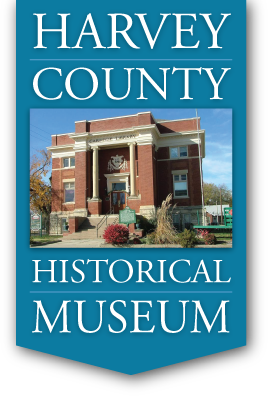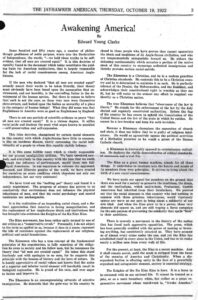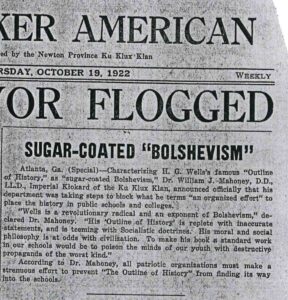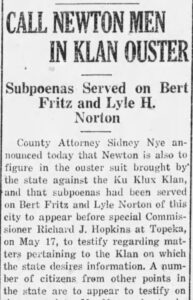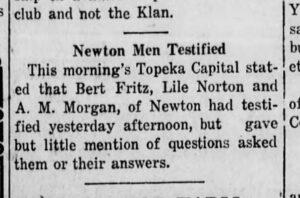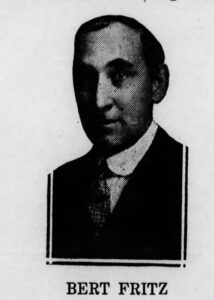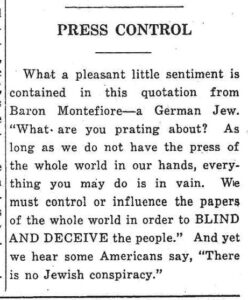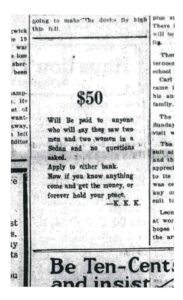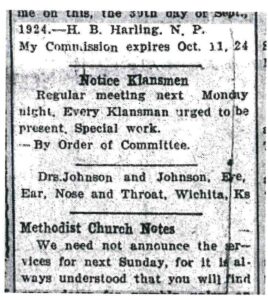by Kristine Schmucker, HCHM Archivist/Curator
“In the mails this morning many citizens were said to have received copies of the first edition of what purports to be the official Kansas publication of the Klan. Where the paper, which is a small four-page publication, is printed is not revealed.” (Evening Kansan Republican, 13 September 1922.)
In the Archives at the Harvey County Historical Museum & Archives there is one issue of the Jayhawker American from 22 October 1922. This document sheds light on Klan activity in Harvey County in 1922-23. A previous post, Hundreds of Automobiles Were Assembled, focused on newspaper accounts of Klan activities around the county. At that time, the publisher and editor of the Jayhawker American was unknown, but additional research has provided the answer.
Jayhawker American
As reported by the editor of the Evening Kansan Republican, the first edition of the Jayhawker American appeared September 12-13, 1922;
“in the mails this morning many citizens were said to have received copies of the first edition of what purports to be the official Kansas publication of the Klan. Where the paper, which is a small four-page publication, is printed is not revealed.”
The Jayhawker American was published weekly, first in Newton, later Wichita, in 1922. To subscribe to the paper, interested men were directed to send $2.00 to Lock Box 112, Newton, Ks. The issue in the Archives dated October 7, 1922 is volume 7.
The paper reported national items of interest, and advertising. The October 19 issue included a lengthy letter from Imperial Klokard, Wm. J. Maloney to a Baptist Minister and an essay by Edward Young Park the Imperial Wizard of the Ku Klux Klan from 1915 to 1922, entitled “Awakening America!”
There is also a short item from Atlanta, GA warning of the dangers of H.G. Well’s “Outline of History.” The Imperial Klokard of the KKK declared that they “were taking steps to block what he terms ‘an organized effort’ to place the history in public schools and colleges . . . the book was teeming with Socialist doctrines . . . and would poison the minds of our youth with destructive propaganda of the worst kind.”
Who Published the Jayhawker?
Despite claims of transparency, a publisher or editor is not indicated with the paper. In May 1923, two Harvey County men and one former resident were subpoenaed to testify at the hearing regarding the ouster suit in Topeka. Men listed in the Evening Kansan Republican, included Lyle Norton, who had boldly proclaimed his membership in the Klan, and Bert Fritz, Newton, former publisher of the Jayhawker American Klan publication. The third person was A. M. Morgan, formerly of Newton, who was also involved with the printing of the Jayhawker American. Morgan had moved the printing of the paper to Wichita by May 1923.
The three men were asked to bring any records regarding the Klan to Topeka with them. They all, however “denied that they have any records.”
Newton Klansman Testified
“A Newton klansman testified he had led 16 kluxers into a church, where he had made a speech. He said he didn’t know the names of the kluxers. An organizer testified he had ‘lost’ all of the records two days before he was subpoenaed to testify . . . he admitted he had told the county attorney he had ‘disposed of’ the records and the state’s attorney Captain Rhodes ordered the witness held until the county attorney could be called to the stand.” (Emporia Gazette 18 May 1923)
The Newton man testifying was Lyle Norton who had dramatically removed his Klan hood at the church.
The Printer: Bert Fritz
In the 1922 50th Anniversary Ed of the Newton Kansan, Bert Fritz was praised as a “wide awake hustler, and a consistent booster for Newton, cheerfully supporting all worthy enterprises in a public spirited, conscientious manner.” Fritz started out working at the Newton Kansan Republican as a “printer’s devil” and slowly worked his way up. He worked in various shops in Newton until August 1899 when he “entered the printing business for himself.” In 1904, he purchased a lot at 114 E 4th and built a new print shop.
A, M. Morgan also assisted with printing the Jayhawker American and later moved to Wichita, taking the printing of the newspaper with him.
” A Klan Organization in Every Town in Kansas”
During questioning during the “ouster” hearings, Noble T. McCall, former secretary of the Arkansas City Klan observed that he “supposed there was a klan organization in every town in Kansas.” During the court proceedings evidence was presented that there were about 400 Klan members in Newton
Several of the men that were involved in other fraternal and civic organizations like the Masons and Lions Club were also involved in the Klan. Lyle Norton was heavily involved with the Lions Club and raising money for the Boy Scouts. During the ouster hearings, it became apparent that the Klan had recruited heavily from existing organizations like the Masons and Lions Clubs. On the surface these group had similar concerns for social, moral and civic welfare of the community. Groups like the Lions Club however worked with community groups “looking towards the elimination of class distinction” and integrating immigrants into American society, the opposite of the Klan’s purpose. (Evening Kansan Republican 18 May 1921)
Mixed Feelings
There were mixed feeling in Harvey County about the Klan. There were local leaders and businessmen that were members of theKlan, but no one knew who. One local pastor spoke out against the Klan. Dr. J.R. Caffyn of the 1st Methodist Episcopal church spoke for an hour and a half on the subject of the Modern Ku Klux Klan.” (Evening Kansan Republican 9 October 1922) Dr. Caffyn’s speech was reprinted in the October 21, 1922 edition of the Evening Kansan Republican.
The editor of the Evening Kansan Republican was also a frequent critic of the Klan in Harvey County.
On the other hand, some Newton pastors felt the organization was a positive one. In April 1923, Rev. Arthur Brooks gave a speech entitled “Americanism” in ElDorado in which he “lauded the principles of the Ku Klux Klan.” In an interview with the Evening Kansan Republican a pastor in Hesston, Rev. Tarvin “seemed to be impressed more favorably . . . and indicated that he believed the organization might be doing a good work.” (Evening Kansan Republican, 20 February 1923). Tarvin had received a donation from the Klan earlier.
Who Were the Members?
Other than Lyle Norton, Bert Fritz and A.M. Morgan there are few clues on who other members might have been. In the testimony during the “ouster hearings” in spring 1923, it was stated that Newton had a membership of 400. There are perhaps clues in the names of the advertisers in the Jayhawker American. Many of these men were also involved in other civic and fraternal organizations. The original members of the Lions Club, established in 1921 in Harvey County, included several men who were advertisers in the Jayhawker including, Lyle Norton, C.V. McDaniel, N.R. Daugherty.
The list of advertisers in the Jayhawker included: E.W. Skidmore – Little Gem Cafe, Palmores Confectionary, B.H. Downs – Merchant Delivery, C.R. Miller – Tailor, Holman & Daughtery – Barbers , E.M. van Aken – Auditorium Cafe, Earl I Schaefer, O.S. Finch, Spear & Munro – owners of a clothing store.
After the Ouster
Even with the “ouster” of the Klan in Kansas, small groups remained somewhat active. In the Sedgwick Pantagraph, September 11, 1924, there was a cryptic note asking about the whereabouts of two men and two women in a Sedan, “no questions asked.”
Meetings continued.
One of the last Klan events mentioned as of this writing was a Klan parade was held in Newton the week of August 8, 1927. It included women and children and men in full regalia without the masks.
Additional Sources
- Evening Kansan Republican, 22 August 1922.
- Allerfeldt, Kristopher. “Jayhawker Fraternities: Masons, Klansmen and Kansas in the 1920s.” Journal of American STudies November 2012, Vol. 46, No. 4 (November 2012) pp. 1035-1053.
- Egan, Timothy. A Fever in the Heartland: the Ku Klux Klan’s Plot to Take Over America, and the Woman Who Stopped Them. New York, NY: Viking, 2023.
